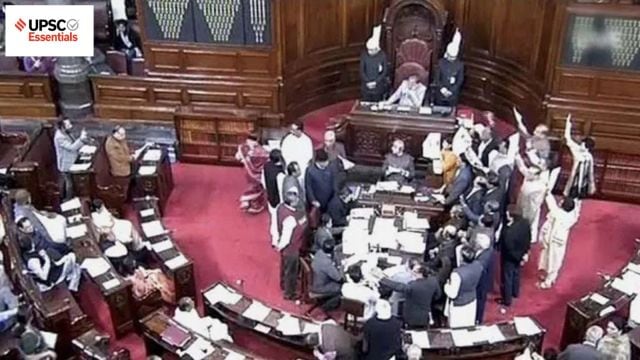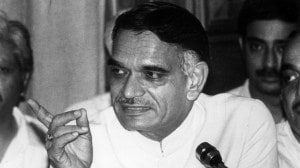
QUESTION 1
A Bill shall be deemed to be a Money Bill if it contains:
1. the imposition, abolition, remission, alteration or regulation of any tax
2. the regulation of the borrowing of money or the giving of any guarantee by the Government of India
3. the appropriation of moneys out of the Consolidated Fund of India.
4. the receipt of money on account of the Consolidated Fund of India or the public account of India or the custody or issue of such money or the audit of the accounts of the Union or of a State.
Select the correct answer using the codes given below:
(a) 1 and 2 only
(b) 2, 3 and 4
(c) 1 and 3 only
(d) 1, 2, 3 and 4
Explanation
Story continues below this ad
— A Bill shall be deemed to be a Money Bill if it contains only provisions dealing with all or any of the following matters, namely:—
(a) the imposition, abolition, remission, alteration or regulation of any tax;
(b) the regulation of the borrowing of money or the giving of any guarantee by the Government of India, or the amendment of the law with respect to any financial obligations undertaken or to be undertaken by the Government of India;
(c) the custody of the Consolidated Fund or the Contingency Fund of India, the payment of moneys into or the withdrawal of moneys from any such Fund;
Story continues below this ad
(d) the appropriation of moneys out of the Consolidated Fund of India;
(e) the declaring of any expenditure to be expenditure charged on the Consolidated Fund of India or the increasing of the amount of any such expenditure;
(f) the receipt of money on account of the Consolidated Fund of India or the public account of India or the custody or issue of such money or the audit of the accounts of the Union or of a State; or
(g) any matter incidental to any of the matters specified in sub-clauses (a) to (f).
Therefore, option (d) is the correct answer.
(Source: Constitution of India)
Story continues below this ad
QUESTION 2
With reference to the Fundamental Duties, consider the following statements:
1. The fundamental duties were incorporated in Part V of the Constitution by the Constitution (42nd Amendment) Act, 1976.
2. The fundamental duties are enforceable by law.
3. The fundamental obligations of citizens have a direct impact on the fundamental rights protected by Articles 14.
How many of the statements given above are correct?
(a) Only one
(b) Only two
(c) All three
(d) None
Explanation
— The fundamental duties were incorporated in Part IV-A of the Constitution by The Constitution (42nd Amendment) Act, 1976, during Indira Gandhi’s Emergency. Article 51(A) describes 11 fundamental duties — 10 came with the 42nd Amendment; the 11th was added by the 86th Amendment in 2002, when Atal Bihari Vajpayee was Prime Minister. Hence, statement 1 is not correct.
Story continues below this ad
— The fundamental obligations of citizens have a direct impact on the fundamental rights protected by Articles 14, 19, and 21 of the constitution. Hence, statement 3 is correct.
— The Fundamental Duties are intended to serve as a constant reminder to all citizens that, while the Constitution grants them specific Fundamental Rights, it also requires citizens to follow certain basic norms of democratic conduct and behaviour because rights and duties are inextricably linked.
— These duties are not enforceable by law. However, a court may take them into account while adjudicating on a matter. Hence, statement 2 is not correct.
— They were made a part of the Constitution to emphasise the obligation of the citizen in return for the fundamental rights that he or she enjoys. The Russian Constitution has the concept of fundamental duties.
Story continues below this ad
— Article 51(A) says it shall be the duty of every citizen of India:
“(a) to abide by the Constitution and respect its ideals and institutions, the National Flag and the National Anthem;
(b) to cherish and follow the noble ideals which inspired our national struggle for freedom;
(c) to uphold and protect the sovereignty, unity and integrity of India;
Story continues below this ad
(d) to defend the country and render national service when called upon to do so;
(e) to promote harmony and the spirit of common brotherhood amongst all the people of India transcending religious, linguistic and regional or sectional diversities; to renounce practices derogatory to the dignity of women;
(f) to value and preserve the rich heritage of our composite culture;
(g) to protect and improve the natural environment including forests, lakes, rivers and wild life, and to have compassion for living creatures;
Story continues below this ad
(h) to develop the scientific temper, humanism and the spirit of inquiry and reform;
(i) to safeguard public property and to abjure violence;
(j) to strive towards excellence in all spheres of individual and collective activity so that the nation constantly rises to higher levels of endeavour and achievement;
(k) who is a parent or guardian to provide opportunities for education to his child or, as the case may be, ward between the age of six and fourteen years.”
Therefore, option (a) is the correct answer.
QUESTION 3
Which of the following articles of the Constitution of India provides for the State to secure a social order for the promotion of welfare of the people?
(a) Article 37
(b) Article 38
(c) Article 39
(d) Article 40
Explanation
— Article 38 of the Constitution of India provides for the State to secure a social order for the promotion of welfare of the people.
— The State shall strive to promote the welfare of the people by securing and protecting as effectively as it may a social order in which justice, social, economic and political, shall inform all the institutions of national life.
— The State shall, in particular, strive to minimise the inequalities in income, and endeavour to eliminate inequalities in status, facilities and opportunities, not only amongst individuals but also amongst groups of people residing in different areas or engaged in different vocations.
Therefore, option (b) is the correct answer.
(Source: Constitution of India)
QUESTION 4
Which of the following words are included in the Preamble of India?
1. Justice
2. Fraternity
3. Insure
4. Liberty
5. Equality
Select the correct answer using the codes given below:
(a) 1, 2 and 3
(b) 2, 3, 4 and 5
(c) 1, 2, 4 and 5
(d) 2, 4 and 5
Explanation
— The preamble of the Constitution serves as a statement clarifying the guiding principles and purpose behind the Constitution of India. When the Constitution first came into force on January 26, 1950, the Preamble stated:
WE, THE PEOPLE OF INDIA, having solemnly resolved to constitute India into a SOVEREIGN DEMOCRATIC REPUBLIC and to secure to all its citizens:
JUSTICE, social, economic and political;
LIBERTY of thought, expression, belief, faith and worship;
EQUALITY of status and of opportunity;
and to promote among them all
FRATERNITY assuring the dignity of the individual and the unity and integrity of the Nation;
IN OUR CONSTITUENT ASSEMBLY this twenty-sixth day of November, 1949, do HEREBY ADOPT, ENACT AND GIVE TO OURSELVES THIS CONSTITUTION.
Therefore, option (c) is the correct answer.
QUESTION 5
Consider the following statements:
1. In a civil case, the plaintiff must prove their case on a “preponderance of probabilities”, meaning their version of events is more likely to be true than the defendant’s.
2. In a criminal case, the prosecution has the much higher burden of proving the guilt of the accused “beyond a reasonable doubt”.
Which of the statements given above is/are correct?
(a) 1 only
(b) 2 only
(c) Both 1 and 2
(d) Neither 1 nor 2
Explanation
— A key distinction between civil and criminal cases is with regards to the burden of proof.
— In a civil case, the plaintiff must prove their case on a “preponderance of probabilities”, meaning their version of events is more likely to be true than the defendant’s. Hence, statement 1 is correct.
— In a criminal case, the prosecution has the much higher burden of proving the guilt of the accused “beyond a reasonable doubt”. This higher standard reflects the serious consequences of criminal conviction, which can involve the loss of liberty. Hence, statement 2 is correct.
Therefore, option (c) is the correct answer.
QUESTION 6
Consider the following statements:
1. High Court (HC) collegiums are led by the incumbent Chief Justice and the four other seniormost judges of that court.
2. The HC collegium recommends the names of judges to be appointed to the High Court although their recommendations must be approved by the SC collegium.
Which of the above given statements is/are true?
(a) 1 only
(b) 2 only
(c) Both 1 and 2
(d) Neither 1 nor 2
Explanation
— The Supreme Court collegium is a five-member body headed by the incumbent Chief Justice of India (CJI), and comprising the four other seniormost judges at that time.
— High Court collegiums are led by the incumbent Chief Justice and the two other seniormost judges of that court. Hence, statement 1 is not correct.
— The SC collegium recommends the names of judges to be appointed to the apex court. So do HC collegiums (for their respective High Courts), although their recommendations must be approved by the SC collegium. Hence, statement 2 is correct.
Therefore, option (b) is the correct answer.
QUESTION 7
Who is the ‘Master of Roster’ of the Supreme Court of India?
(a) The Attorney General of India
(b) The Chief Justice of India
(c) Any judge appointed by the Collegium excluding the Chief Justice of India
(d) The Collegium
Explanation
— The Supreme Court upheld in 2018 the Chief Justice of India’s role as “Master of Roster”. A two-judge bench, comprising Justices A K Sikri and Ashok Bhushan, stated that the CJI’s role cannot be interpreted to include the Collegium when it comes to the allocation for cases as it will make day-to-day functioning difficult.
Therefore, option (b) is the correct answer.
QUESTION 8
What did the Supreme Court uphold in Pramati Educational and Cultural Trust vs. Union of India?
(a) Admissions must be taken in private schools with a fixed quota for students in the EWS (Economically Weaker Sections) category.
(b) Education boards must include cultural elements of India in their curriculum.
(c) Minority schools are not required to comply with the Right to Education Act of 2009.
(d) A nutrition-rich mid-day meal must be made compulsory in all government schools.
Explanation
— In 2014, the Supreme Court’s Constitution Bench in Pramati Educational and Cultural Trust vs Union of India carved out a sweeping exemption: minority schools, aided (receiving government funding) or unaided, need not comply with the Right to Education Act of 2009.
— That meant no compulsion to follow its norms, such as the 25% quota for disadvantaged students. But on Monday (September 1), a two-judge bench led by Justice Dipankar Datta questioned whether this blanket immunity was ever justified.
Therefore, option (c) is the correct answer.
Previous Daily Subject-Wise-Quiz
Daily Subject-wise quiz — History, Culture, and Social Issues (Week 124)
Daily subject-wise quiz — Polity and Governance (Week 125)
Daily subject-wise quiz — Science and Technology (Week 125)
Daily subject-wise quiz — Economy (Week 125)
Daily subject-wise quiz — Environment and Geography (Week 125)
Daily subject-wise quiz – International Relations (Week 125)
Subscribe to our UPSC newsletter and stay updated with the news cues from the past week.
Stay updated with the latest UPSC articles by joining our Telegram channel – IndianExpress UPSC Hub, and follow us onInstagramand X.


































